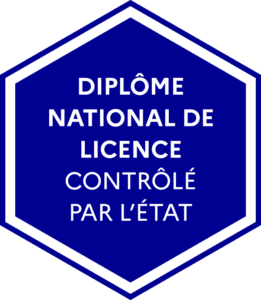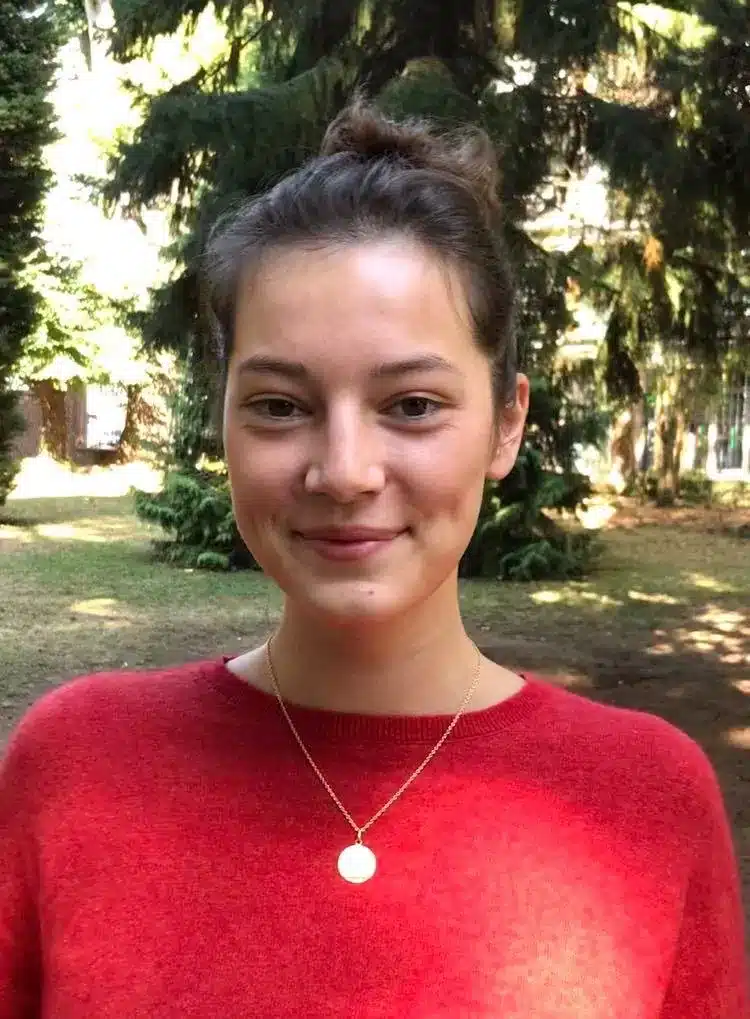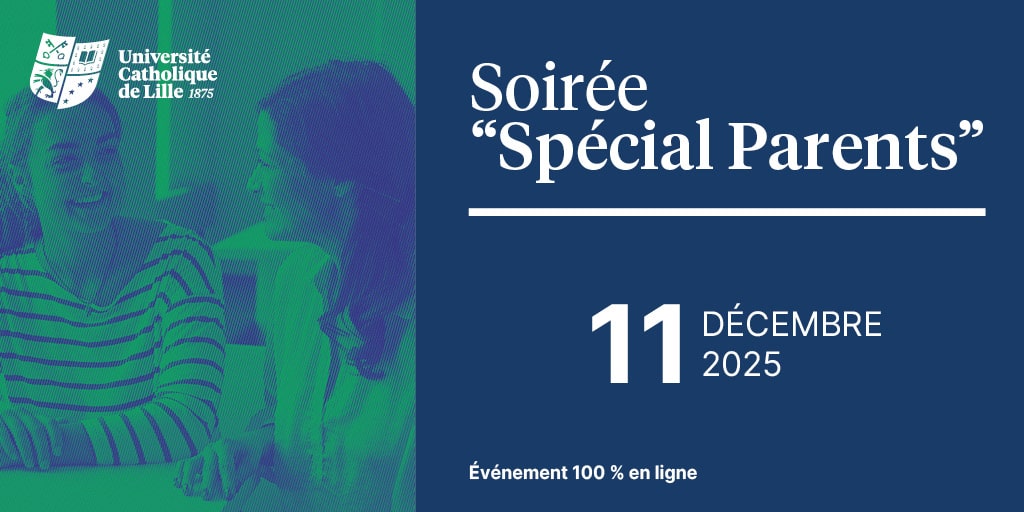Diplôme national en convention avec l’Université de Lille.
Licence Droit-Economie-Gestion, Mention Economie et Gestion
Diplôme national en convention avec l’Université de Lille.
Licence Droit-Economie-Gestion, Mention Economie et Gestion

Diplôme national en convention avec l’Université de Lille.
Licence Droit-Economie-Gestion, Mention Economie et Gestion
| BCC 1 : Fondamentaux en économie et gestion | ECTS |
| Théories des organisations | 2 |
| Initiation à la pensée économique | 2 |
| Comptabilité nationale | 2 |
| Introduction au droit de l’entreprise | 3 |
| Introduction à la finance de marché | 3 |
| Monnaie Banque Finance | 3 |
| Macroéconomie | 2.5 |
| Organisation juridictionnelle et Institutions Européennes | 1.5 |
| Comptabilité financière | 3 |
| Introduction à la microéconomie | 2 |
| Histoire de la pensée économique | 2 |
| BCC 2 : Outils et méthodologies pour l’économie et la gestion | |
| Mathématiques appliquées à l’économie | 4 |
| Statistiques et initiation au logiciel Excel | 4 |
| Entreprise et vie économique | 8 |
| Anglais | 8 |
| BCC 3 : Développer un agir éthique et responsable Les matières du BCC 3 dépendront du choix du parcours optionnel (ci-dessous quelques exemples de matières possibles). | |
| Remise à niveau en Maths ou LV2 (Parcours Économie Avancée) | 10 |
| Democracy in Asia (Parcours Sciences Politiques) | 10 |
| Ateliers création d’entreprise (Parcours Étudiant Créateur) | 10 |
| BCC 1 : Fondamentaux en économie et gestion | ECTS |
| International economics | 3 |
| Corporate Social Responsibility | 4 |
| La monnaie | 3 |
| Conjoncture macroéconomique | 2 |
| Analyse microéconomique | 2 |
| Introduction to intercultural management | 3 |
| Gestion des coûts | 3 |
| Macroéconomie | 2 |
| Microéconomie | 3 |
| BCC 2 : Outils et méthodologies pour l’économie et la gestion | |
| Mathématiques appliquées à l’économie | 5.5 |
| Statistiques | 5.5 |
| Anglais | 8 |
| Approche du monde du travail et rapport de stage 1ère année | 2 |
| Excel et R | 2 |
| Calculs financiers | 4 |
| BCC 3 : Développer un agir éthique et responsable Les matières du BCC 3 dépendront du choix du parcours optionnel (ci-dessous quelques exemples de matières possibles). | |
| Introduction aux problèmes économiques contemporains (Parcours Economie Avancée) | 8 |
| Africa and the 21st century: ressources, governance, stability and growth (Parcours Sciences Politiques) | 8 |
| Ateliers création d’entreprise (Parcours Étudiant Créateur) | 8 |
| BCC 1 : Fondamentaux en économie et gestion | ECTS |
| Macroéconomie financière et FinTech | 2 |
| Théorie du risque | 3 |
| Recherche opérationnelle | 2 |
| Management d’entreprise | 2 |
| Théorie des marchés financiers | 3 |
| Gestion de portefeuille, couverture et trading | 3 |
| Analyse de la croissance économique | 3 |
| Mathématiques appliquées à l’économiste | 2 |
| Introduction à l’audit | 2 |
| BCC 2 : Outils et méthodologies pour l’économie et la gestion | |
| Fiscalité d’Entreprise | 3 |
| Analyse financière | 3 |
| Anglais | 8 |
| Analyse de données | 3 |
| Initiation à la programmation | 2 |
| Stage 2ème année et approche du monde du travail | 2 |
| Approche du monde du travail projet d’initiative | 3 |
| Investment Appraisal | 4 |
| BCC 3 : Développer un agir éthique et responsable | |
| Les matières du BCC 3 dépendront du choix du parcours optionnel (ci-dessous quelques exemples de matières possibles). | |
| Introduction à la gestion de patrimoine (Parcours Ouverture Culturelle) | 8 |
| The Challenges of ICT’s (Information, communication, technology) : Privacy, Democracy, Truth (Parcours Sciences Politiques) | 8 |
| Ateliers création d’entreprise (Parcours Etudiant Créateur) | 8 |
A choisir à la rentrée universitaire
Matières du Parcours
2 matières par semestre à choisir dans des pôles différents
A choisir à la rentrée universitaire
Il bénéficie de temps dédié au développement de son projet (4 après-midis par semaine) et il est accompagné par le HubHouse, incubateur-accélérateur de l’Université.
Chaque année est validée par 3 temps de jury : en novembre pour le semestre 1 (4 crédits), en février et en mai pour le semestre 2 (4 crédits).
Le parcours Start-up « à Impact Positif » a été créé pour mettre à sa disposition des ressources et des outils qui rendent possibles la création d’un projet en réponse aux problèmes locaux de la région.
Les différentes étapes :
– L1 : émergence du projet (développement de l’idée, étude de marché et validation de la problématique, développement d’un plan de projet)
– L2 : étude de faisabilité du projet (business model, communication et fonctionnement en mode réseau, développement du prototype)
– L3 : mise en œuvre (phase d’expérimentation, accompagnement avec les coaches, participation au concours régional FGES Start-up à impact positif)
Matières du Parcours
En licence 1 :
A choisir à la rentrée universitaire
Matières du Parcours
4 matières dispensées par an
– L1 semestre 1 : Global geopotical risk and Business decision-making / Democracy in Asia
– L1 semestre 2 : Conflicts, mediation / Rwanda, Libya, Syria – The responsibility to protect : when to intervene ?
– L2 semestre 3 : Africa and the 21st century : ressources ; governance, stability and growth / Explaining the rise of Japan
– L2 semestre 4 : The rise of populist parties and personalities : the liberal order at risk / From Mao to Xi : charting the future of China
– L3 semestre 5 : Japan : Work and Gender / The Challenges of ICT’s (Information, communication, technology) : Privacy, Democracy, Truth
– L3 semestre 6 : Examining the Behavior of U.S. Foreign Policy : Contending Theories of International Relations / Forecasting the 21st Century : Politics, Business, Technology, Development, Environment, and Conflict
Choix à faire sur la plateforme d’inscription en 1ère année universitaire (parcoursup.fr)
Matières du Parcours
Cours de préparation aux concours des grandes écoles (voir page Prépa)
Lycéens issus d’un bac général ayant suivi les spécialités suivantes :
La totalité du processus de candidature se fait via la plateforme Parcoursup
Les élèves de Terminale souhaitant candidater en première année dans l’une de nos Licences, en Classe prépa école de commerce ou en Année de préparation aux études scientifiques doivent suivre la procédure Parcoursup.
Il leur sera demandé de constituer un dossier avec un CV, une lettre de motivation et leurs résultats de 1ère et de Terminale.
Le processus de sélection est le suivant. Les candidats seront sélectionnés après étude de leur dossier.
Pour les licences Sciences de la Vie, Comptabilité Finance Audit et Internationale d’Economie & de Gestion, un entretien de sélection sera proposé.
Pour la licence Internationale d’Économie & de Gestion un test écrit viendra s’ajouter à l’entretien
Pour la Prépa, en complément de l’étude du dossier, des tests écrits seront mis en place portant sur les matières suivantes : logique / culture générale / anglais.
Par ailleurs, des frais de dossier seront demandés à hauteur de 70 € par candidature (ex : si un lycéen candidate à 2 formations chez nous, il devra s’acquitter de 140 € de frais et ainsi de suite…). Ces frais seront remboursés dans leur totalité si le candidat s’inscrit définitivement à la FGES. Les boursiers sont exemptés de ces frais de dossier.
| PÉRIODE | PHASE | DÉTAILS & INFORMATIONS |
|---|---|---|
| Novembre 2025 à Janvier 2026 | Je m’informe et découvre les formations |
Préparez votre projet de poursuite d’études : - Consultez les sites avenirs.onisep.fr et parcoursup.gouv.fr - Utilisez l’outil MonProjetSup - Échangez avec votre professeur principal ou le service orientation. Mercredi 17 décembre 2025 : ouverture de la carte des formations 2026 sur Parcoursup. |
| 19 janvier au 12 mars 2026 | Je m’inscris et formule mes vœux |
- Créez votre dossier candidat sur Parcoursup dès le lundi 19 janvier. - Formulez jusqu’à 10 vœux sans classement obligatoire (+10 vœux pour l’apprentissage). Jeudi 12 mars 2026 : dernier jour pour formuler vos vœux. |
| 1er avril 2026 | Je confirme mes vœux |
Mercredi 1er avril 2026 : dernier jour pour compléter et confirmer vos vœux. Conseil : n’attendez pas la dernière minute pour finaliser votre dossier. Rappel : les formations en apprentissage restent ouvertes après cette date. |
| 2 juin au 11 juillet 2026 | Phase d’admission principale |
Mardi 2 juin 2026 : début de la phase d’admission principale. - Consultez vos propositions d’admission (“Oui” ou “Oui-si”). - Répondez dans les délais et suivez vos vœux en attente. Samedi 11 juillet 2026 : fin de la phase principale. |
| 11 juin au 10 septembre 2026 | Phase complémentaire |
Jeudi 11 juin 2026 : ouverture de la phase complémentaire (10 nouveaux vœux possibles). Jeudi 10 septembre 2026 : fin de la phase complémentaire. Les candidats peuvent encore intégrer des formations disposant de places vacantes. |
Vous venez d’un établissement extérieur et vous souhaitez continuer vos études, en Licence 2 ou Licence 3 ? Rendez-vous sur notre site Espace Admission pour candidater.
Les étapes de candidatures :
Une poursuite d’études facilitée par les parcours proposés :




